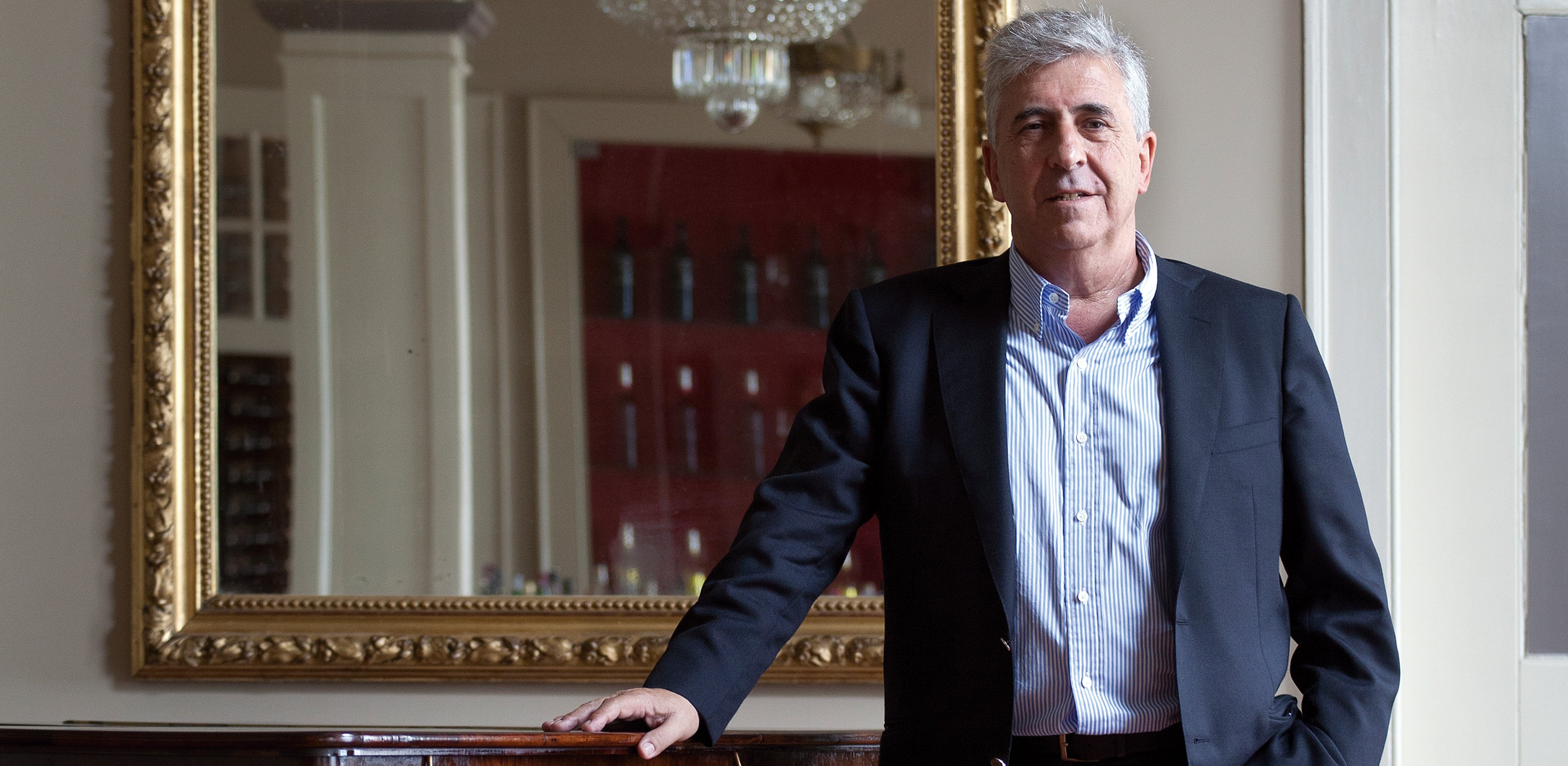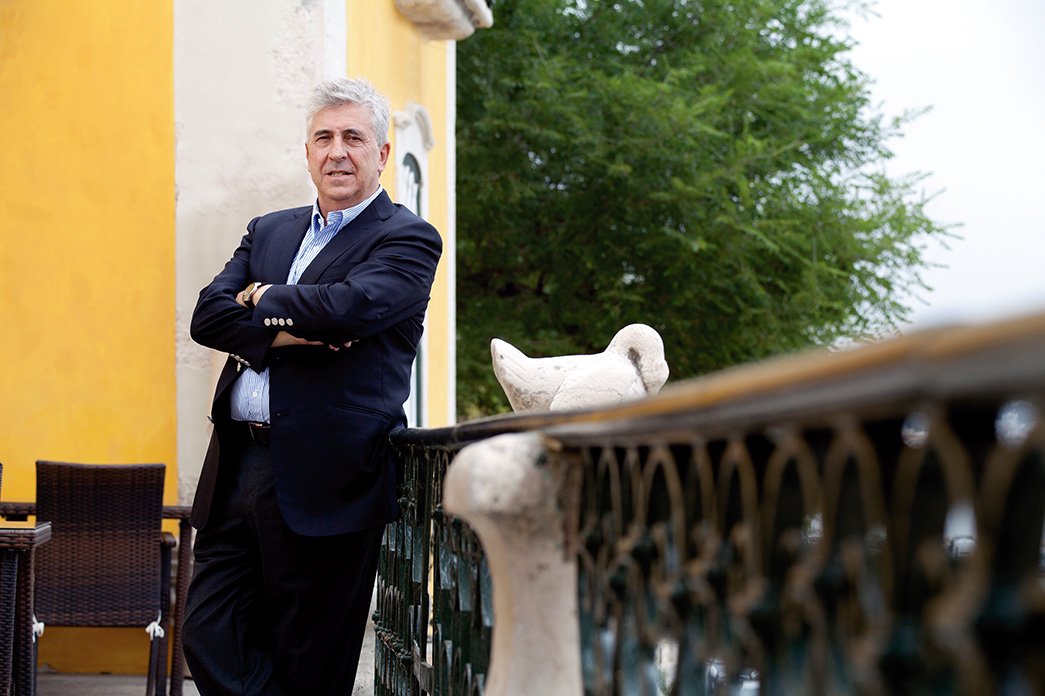
Smiling and highly active, he has a habit of starting his day early and finishing it late. He loves what he does, and we could feel this in the words of the long conversation we had with Jorge Rebelo de Almeida, the founder and chairman of Vila Galé hotels. He welcomed us in Paço de Arcos, in a 15th century palace, which is home to one of the group’s hotels - the Vila Galé Collection Pálacio dos Arcos. The businessman has been in the tourism industry for over 35 years and has more than 40 hotels in Portugal, Brazil, Cuba and Spain. Serenely, he spoke to us about his projects, his vision of national tourism, the Portuguese coast, culture and so much more. He says he manages to find time to have fun in the midst of the hubbub of his day because, according to him, when you work hard... «you have to savour the wonderful things in small doses».
When you started
working in the tourist industry more than 35 years ago, did you ever imagine
that you would become a player in one of the country’s most prominent sectors?
Not at all. I started
out as a lawyer. I practised law for 13 years and even achieved some success,
especially in the areas I specialised in, which had to do with issues of
contracts, projects and works. I always liked projects and building work, but
even though I loved being a lawyer and what I was doing, something wasn’t quite
right. At first, I created a project on Galé beach, which we called Vila Galé.
I started it with two friends, who had other businesses, and I used all the
experience I had in construction and tourism, because I’d had a lot of clients
in those areas. It was then that I became interested in tourism. One thing is
certain: it never crossed my mind to create a hotel group.
So that’s how the
hotel group with the name Vila Galé was born?
Yes. At a lunch at
Portugália, an architect friend of mine and I came up with the logo. I don’t
have a flair for drawing, but I do have a flair for architecture and interior
design, so much so that the overwhelming majority of our projects are designed
by me and my team, which I really enjoy doing. Today, we have 42 hotels in
operation and two more that opened in April, in Figueira da Foz and Isla
Canela, in the south of Spain. And in Brazil we have two under construction. In
Cuba, we started in October last year with a marvellous hotel on a stunning
beach in CayoParedón. Cuba really is a marvellous place. It’s a shame it’s
going through a bit of a difficult phase... but I believe it will get through
it. This hotel belongs to the Cuban state, it wasn’t our investment, we were
hired to run the hotel.
What challenges has
the group had to face along this long journey?
The Vila Galé group
can be defined as a company that has mobilised and motivated many people, and
it has been a major challenge to create a hotel group that today has everything
I ever dreamed of. This is a serious company, prestigious, socially responsible
and concerned with environmental sustainability. The group is not concerned
with making money; on the contrary, it’s concerned with doing useful projects
for society. I would go so far as to say that we are the group that has carried
out the most historical heritage restoration projects in Portugal. Today, the
company employs over 5,000 people, 2,200 of them in Portugal.
We all have a bit of a
crazy side, we love challenges, doing works and projects, which isn’t easy in a
country like ours, just as it isn’t in Brazil, where approval difficulties are
immense. Here in Portugal, for example, we have a lot of projects in the
pipeline, all of them distinctive, but it takes time. For example, we’re
developing another project in the historic centre of Elvas, which is completely
different - it’s in a street with houses on either side and it involves
restoring an old plum factory, which used to be known as
"Rainha-Cláudia" and is now just called the Elvas plum.
We’re also restoring a
castle, the Paço do Curutêlo, in Ponte de Lima, in Freixo. It’s a 60-hectare
estate with a castle dating back to 1126, which means it predates the birth of
Portugal. As the estate is very large and has 10 hectares of Loureiro vines, we
are preparing to start planting and we also have a winery under construction.
This is another investment in the wine sector, which will join the estate we
already have in the Alentejo - Santa Vitória (which includes three hotels) -
which produces wines and olive oils, fruit and livestock; and the one we have
also had in the Douro, in Armamar, for six years.
The Vila Galé group
has more than 30 hotels in Portugal, from north to south, many of them by the
sea. Does this make these hotels more appealing?
Of course it does. In
Portugal, we have established destinations: The Algarve, Lisbon and the Lisbon
coast, and Oporto. Figueira da Foz has also been and is now a place where we’re
going to restore an old hotel on the beachfront, the Grande Hotel da Figueira.
But the Vila Galé
group, alongside these hotels in more prominent locations, has been investing
in the interior. The interior of our country, which is beautiful, is forgotten
because our politicians, from left to right, talk a lot about the interior but
then do little about it. Within the group, we’ve started to build a hotel in
Braga, which is in one of the city’s central squares, and we have another
project in the pipeline in Miranda do Douro, above the dam. It’s projects like
these that help develop the interior. I’ve said it before, and many people don’t
agree with me, that it makes no sense to build the TGV from Lisbon to Oporto,
because I don’t think it will add anything and it’s a lot of investment money,
which will require a tremendous amount of debt, when we already have a very
high public debt. If this Lisbon to Oporto were to bring great development to
the country then yes, but it won’t. On the train that already exists, the
journey is very pleasant and, if the line were improved with 10% of what they want
to spend on the TGV, the line would be excellent and there would be money left
over to improve the entire national railway network. We’re talking about 10
billion euros. The TGV that would interest us, that would add value to the
country, is the Lisbon-Madrid TGV, but for that we have to solve this problem
of the differing railway gauges in Iberia. Another thing that would be
fundamental to developing the interior of the north of the country would be to
continue that beautiful road, either in Lamego, across from Régua, or in
Armamar, where we have the Vila Galé Vineyards, in other words, the road that
runs from Régua to Pinhão. If there was a will to do things and contribute to
the development of the interior, this road would be built, from the riverside
to FozCôa. It would enhance FozCôa and the whole of the upper Douro, which is
gorgeous.
But do you still see
tourism potential on the Portuguese coast?
I see a lot of
potential from north to south, and there’s plenty of room. The Algarve’s
coastline is already full enough. Today, with the limitations imposed by the
coastal plan, there’s no longer much room for more projects. The Alentejo and
Algarve coasts, on the other hand, facing the western Atlantic, have potential
and are developing, but only slowly.
As Portugal has such a
huge maritime area, what do you think are the obstacles preventing its maritime
and coastal potential from being utilised?
A lot of time is
wasted on the general directorate of cultural heritage, it’s an obstacle to the
recovery of a lot of existing heritage, and in the maritime area it’s not even
mentioned. We had the port of Lisbon, which stalled for years, as well as the
development of the waterfront in both Lisbon and Oporto, which prevented the
cities from turning towards the river. Approving a marina in this country is
practically a 15-year process. It’s clear that many people give up, because
nobody has the patience to put up with a project that takes ten or 15 years. As far as maritime
areas are concerned, the sea is one of the most incredible things we have in
Portugal. When there are public demonstrations, people argue that the sea is
extremely important for our economy and that it could be a major source of
revenue, but unfortunately, in practice, people just talk, they never do
anything. If someone wants to set up a fish farming project, it’s extremely
difficult.
Do you believe that
climate change could prove an obstacle to building infrastructure near the sea?
Reconciling the
environment with economic development is possible, but it has to be done
carefully. In ten years’ time, anyone with a hotel that doesn’t respect
environmental standards and values won’t have any guests. In order for tourism
to be balanced, the country needs to develop harmoniously in various sectors of
the economy and, culturally, it needs to remain attractive.











